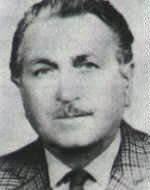Tuvia (Tobias), Arie (Marcel)
Son of Yosef and Josefina. He was born on April 25, 1914 in Vienna, capital of Austria. He completed his studies at the military academy under the name of the empress Teresa, and since then he has been through the army, and in the Austrian army he completed an officers’ training course and was assigned to the engineering corps, and after a while his turbulent spirit forced him to abandon the quiet Austria of those days. He spent six months of basic training at the legion of the famous recruits of the Legion-Sidi-Bel-Abbas, whose family searched for him and released him from the Legion under the intervention of the Austrian consul, and on the grounds that he had not yet reached the age of 21. When he was released, he returned to Austria, Austria before the Anschluss to Nazi Germany Marcel, who was a member of the Betar youth movement Vienna, and dreamed of Zion and the Land of Israel, came on an illegal immigrant ship sailed on the Danube towards the Black Sea and from there – to the shores of the promised land. He arrived as an illegal immigrant to the shores of Netanya and from there joined the Betar company in Rosh Pina, where he was involved in the land work, while the nights were devoted to weapons training and activities in the Irgun underground. When the Second World War broke out, Marcel volunteered for the British Army and together with the Wingate commandos participated in the liberation of Habash from the Italians. Before the war was over, he joined the “Jewish Brigade” and, after its completion, helped smuggle Jewish Holocaust survivors into Palestine and was in an elite unit of Israeli soldiers looking for Nazi war criminals to try them. After being discharged from the British army, he volunteered for the Jewish settlement police. In May 1948, when the state was established, he enlisted in the IDF and commanded convoys that broke the roads to isolated settlements in the Galilee and Jerusalem, and was a training instructor for the Oded Brigade and commander of a company in the Alexandroni Brigade. During the retaliation, Marcel participated as a fighter for the first line, and as one of the fighters of that period noted: “All the paratroopers had a commander, a leader, an exceptional figure, an ageless figure who had not been influenced by the years.” During the Kadesh War, he was among the soldiers of the battalion that parachuted into the Mitla as Rafol’s deputy A very bold controller, immune to fire. He removed wounded on his back, carried them to the assembly point and returned to the line of fire. “Later on in the IDF, Marcel was the commander of the first commando course and the deputy commander of the School for Parachuting and Small Warfare. A paratrooper and infantry officer recalled that Marcel “was not one of those who spoke a lot. Everything we have done, he has performed before us – in the obstacle course, in weapons training, in trips, in touch battles and in arduous exercises. He was everyone’s teacher. “Marcel was sent to Nepal at the head of an IDF delegation and established a paratroop school and a paratroopers unit of Nepali, composed of courageous Gurka fighters. Marcel made them excellent paratroopers and fighters proficient in all ways of fighting. Marcel spent six years in this capacity, and during that period he organized daring rescue operations by parachuting food and medicines into areas cut off by natural disasters. From Nepal, Marcel was sent to a similar position in Zaire – the former Belgian Congo. He managed very well there too. On 5 November 1972, Lt. Col. Marcel fell in the line of duty in Zaire, leaving a wife and three children, all of whom served in the paratroopers, and was brought to rest in the military cemetery in Kiryat Shaul, where his wealthy library was donated by his family to a unit The paratroopers are engraved on the memorial to the paratroopers, to commemorate their memory, are named after a training ground at the parachute school and the gymnasium at the Arnon school in Ramat Gan.
